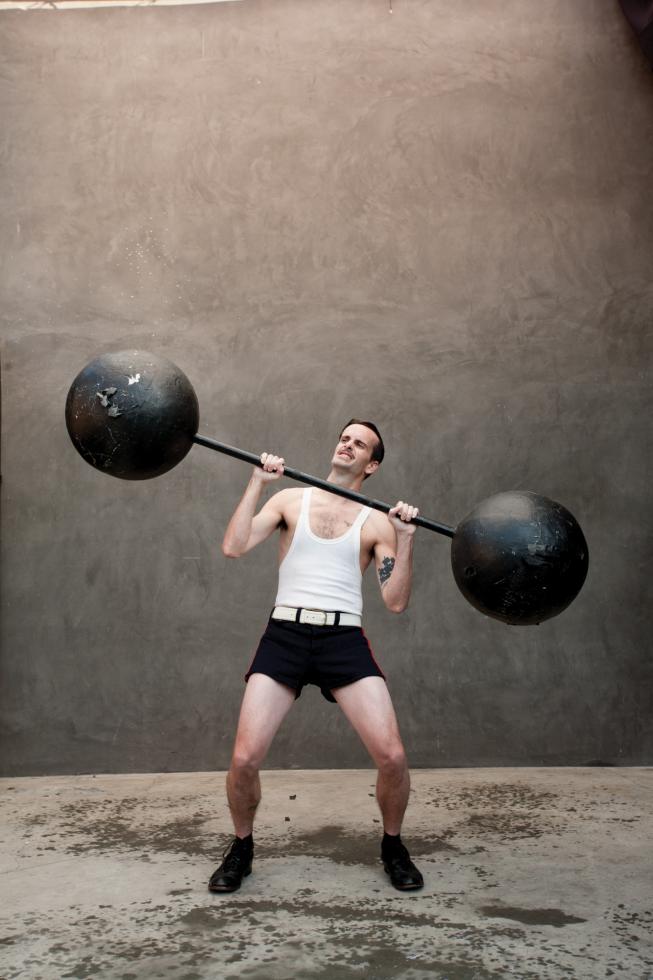Low testosterone. For men, these words have the same foul odor as “impotence,” “shrinkage” or “Justin Bieber.” The topic is taboo. Throughout civilization testosterone has been prized as the lifeblood of manhood, so a deficit would imply, by definition, that we are somehow less manly.
Yet despite this ancient bias, there’s now a growing push in the medical community to help diagnose low testosterone, clear up the fog of misconceptions and treat the issue with Testosterone Replacement Therapy, or TRT.
Let’s imagine that you, or, better yet, “your friend,” is experiencing the symptoms of low testosterone: fatigue, a sense of blahness, low sex drive, an iffy stiffy. Your friend could visit Dr. Alan Shindel at the UC Davis Medical Center, who would first try and identify other possible causes. “Even men with completely normal levels of testosterone can have erectile dysfunction, low sex drive or poor energy,” says Shindel, a urology specialist. “Sometimes the cause of a man’s symptoms is just life — stress, medical conditions, relationship issues, trouble at work.”
But it could be “Low T.” Testosterone, a hormone, does more than just power your sexual engine. The body uses it to help support muscle growth, strengthen bones, regulate the count of red blood cells, boost psychological well-being and promote a healthy distribution of fat. When the average man hits 30, his testosterone levels begin falling by about 1 percent each year. As the hormones decline, the body becomes less efficient. Sometimes the side effects aren’t imagined, they’re real.
The exact measure of “normal” testosterone is tricky to pinpoint and varies from patient to patient and doctor to doctor, but the range is generally around 400 to 800 ng/dl, or nanograms per deciliter. So if Dr. Shindel thinks your friend is a candidate for Low T, he would administer a blood test to check these levels.
But why bother? Can it help? The short answer: Probably. The most obvious benefit is a souped-up libido, but Dr. Shindel says the thing he hears his patients talk about most is a change in psychological well-being. Men tell him, “I feel more like myself again,” and that they’re getting more out of life. Other benefits can include increased bone density (specifically in the hip and spine), a lower likelihood of osteoporosis (bone disease), sharper focus and firmer erections. The true believers say it can extend your life.
When Nelson Vergel was diagnosed with HIV in 1986, his body withered, his libido cratered and he felt like a ghost of his former self. Then he started TRT, and after his energy, weight and sex drive roared back, he was so thrilled with the results that he learned everything he could about it, self-published the book “Testosterone: A Man’s Guide” and has since devoted his life to educating men on the subject.
Vergel has, over the years, received more than 10,000 emails from men curious about testosterone. He coaches, gives lectures and helps guide men through the process. “In the first month, they’re talking to girls differently,” Vergel says. “Or they say, ‘I’m nicer to my wife.’ People think that taking testosterone will make you angrier. It’s the opposite.
“I get emails all the time saying, ‘You’ve saved my life’ or, ‘You’ve saved my relationship,’” he says. “But the thing I hear most often is actually, ‘I’m more focused.’ Testosterone is not all about sex. When I have higher testosterone, I feel different. I’m sharper. I’m more with it.”
Side-effects Might Include…
So about those asterisks.
First off, there’s no guarantee TRT will work. Some men simply don’t respond to the treatment. Dr. Karen Herbst, a testosterone deficiency specialist at UC San Diego, told WebMD that while one in 10 men are “ecstatic” with the outcome, there’s another one in 10 who “don’t notice much.” The rest fall in between.
The list of side-effects reads like a Saturday Night Live spoof. The risks include acne, swelling of the legs, shrinking of the testicles (ah, the irony!), polycythemia (a spike in red blood cells), and the possibility for snoring, liver damage, lower sperm count and lower good cholesterol.
Historically, the most alarming side-effect was thought to be an increased risk of prostate cancer, which, for many doctors, made the treatment a deal-breaker. Study after study has debunked this. Dr. Abraham Morgentaler, a professor at Harvard Medical School and the founder of Men’s Health Boston, writes in his book “Testosterone for Life” that he no longer fears that “giving a man T therapy will make a hidden prostate cancer grow or put him at increased risk of developing prostate cancer down the road.”
More fine print: While the studies have generally shown that TRT will not increase the odds of prostate cancer in healthy men, they have tended to confirm that men who do have prostate cancer can worsen their condition with TRT. This adds to the misconceptions.
Perceptions are changing, however. “The awareness of hormone replacement therapy for men has definitely increased. Some of that has to do with more research, suggesting that TRT is not the bugaboo or culprit of prostate cancer,” Shindel says.
How it Works
The typical patient is a salt-and-pepper type in his 40s to 60s, although patients range from their 30s to 80s. Sometimes the trigger is divorce: Men are newly single, back on the market and suddenly catering to the sexual appetite of a frisky 20-something. “I actually don’t want anything for myself,” explains a patient in “Testosterone for Life.” “But Clarice deserves more from me. She’s a younger woman, she took a chance on a guy like me with two kids already and she deserves to have sex on a regular basis.” After TRT, he started getting morning erections and writes, “It’s like seeing an old friend again.”
Curious? There’s more you need to know. Thoroughly talk to your doctor, avoid the online providers (Googling “Sacramento testosterone” can fetch some shady results), and understand that TRT isn’t as simple as Viagra, where you just pop a pill and feel the magic. The treatment itself can be awkward, time-intensive and involve frequent check-ups with your doctor. It’s a commitment.
Despite the name “Testosterone Replacement Therapy,” there’s no literal “replacement.” Your doctor doesn’t connect you to a tube and suck away the bad testosterone and pump you full of tough-guy serum. The pituitary gland, located in your brain, has a feedback loop that senses when your body is injected with external testosterone. When your brain senses this incoming substance, it freezes production of your own natural supply. Over time, the testosterone is thus “replaced.”
The main ways to consume testosterone are needles, gels, pellets, creams or via patch. None of them sound awesome. Needle injections have the upside of being performed only weekly or bi-weekly, and they’re the most reliable way to get the T into your body. The downside — besides getting a shot in your ass — is that you might experience “roller coaster” testosterone spikes at the beginning of the cycle and then a slump at the end.
Gels are the most common method. With a gel, every morning you smear the gunk to your shoulders, chest or upper arms. Not only is this a nuisance, but you can’t shower for at least an hour after the application, and you should temporarily avoid “skin to skin” contact — so no sex without a t-shirt.
Other options include creams, pellets (grafted under your skin), teeth adhesives and a patch like the kind you would wear to kick nicotine. The benefit of the patch is that it’s easier to self-administer, and the downside is that, well, you’re always wearing a patch. This could raise unwanted questions in the bedroom, as not every man who’s using TRT has told his partner or wife.
That level of secrecy strikes to the heart of what makes testosterone treatment unusual. It’s an awkward topic to discuss. If you have money problems, back problems, kid problems or even wife problems you can (usually) confide in a good friend after a few slugs of beer. But low testosterone? Soft erections? No man wants to look his best friend in the eye and say, “I’m flaccid, Steve.”
“Men have no one to talk to,” Vergel says. “They have no way to compare. They have no way to understand what’s the normal frequency of sex. This means that millions of men might be valid candidates, but they wouldn’t acknowledge the symptoms.”
Fair point, but then how do we explain the success of Viagra? “Marketing works. Pfizer is a genius,” Vergel says, laughing. “We’ve been hit with years of advertisements, where men are smiling and the women next to them are smiling even bigger.” He also points out that while Viagra is recreational, TRT is a commitment. Testosterone is daily, it’s weekly, it’s a medical treatment. It’s for life.
The Barry Bonds Factor
Misconceptions abound, both negative and positive. Testosterone is a steroid, and thanks to the juicy trials of Barry Bonds and Lance Armstrong, we tend to think of “steroids” as a cheat.
But these are symptoms of steroid abuse, not the symptoms of TRT, which has the more modest goal of returning testosterone to normal levels. The average dose for a normal patient is about 100 mgs a week. Juicing bodybuilders can inject over 1,000 mgs a week. Crude analogy: A diet of 8,000 calories a day will make you fat, but this doesn’t mean that all calories are evil.
Yes, testosterone is a “steroid,” but the body is full of steroids. Cholesterol is a steroid. If we didn’t have steroids, we would die. Personal testimony: Following a retinal inflammation in my left eye, I’ve been taking a daily eye-drop called prednisolone, a steroid, for more than 15 years. My eye has not bulged, I do not have ‘roid rage and I will not be confessing to Oprah.
“We need to let go of the idea that testosterone is illegal, dangerous and evil,” writes Dr. Morgentaler. “It is not the cause of male violence or aggression. There is little evidence that it increases the risk of heart disease or prostate cancer; in fact, there is growing evidence that it may protect against these conditions.”
We also shouldn’t let the pendulum swing too far. “Testosterone is not the fountain of youth. It won’t make you 18 again. It won’t make you live forever,” says Dr. Shindel. Even the faithful concede that TRT is not a panacea, countless different studies have yielded countless different results, and it has its skeptics — the Mayo Clinic’s website cautions that “treating normal aging with testosterone therapy is not currently advisable.”
More philosophically, is it right to try and defy aging?
TRT champions reject the ethical dilemma. “The idea that we should not meddle with Mother Nature is hogwash,” argues Dr. Morgentaler. “We meddle with nature every day when it comes to our health. ‘Normal, natural aging’ is associated with bad eyes, bad hearing, bad teeth, bad blood vessels, bad hearts and cancer … Should we withhold offering prescription glasses to older men and women because poor vision is common with advancing years and thus ‘normal’? It’s a ridiculous notion. Low T is no different.”
Recommended For You

Juiced
Bowel Formula No. 2, friend or foe?
It’s a seductive pitch: Cleanse your body. Feel healthy. Lose weight.
You only have to do one thing: starve.





